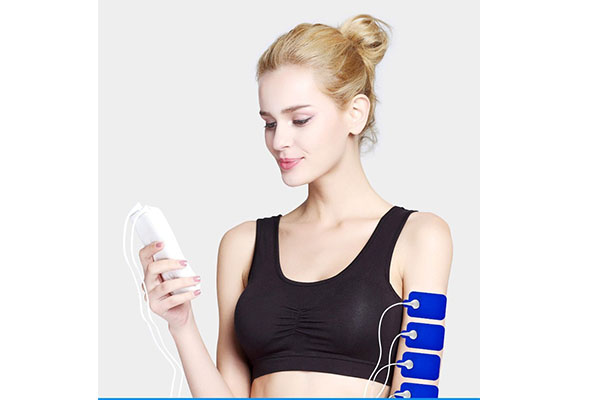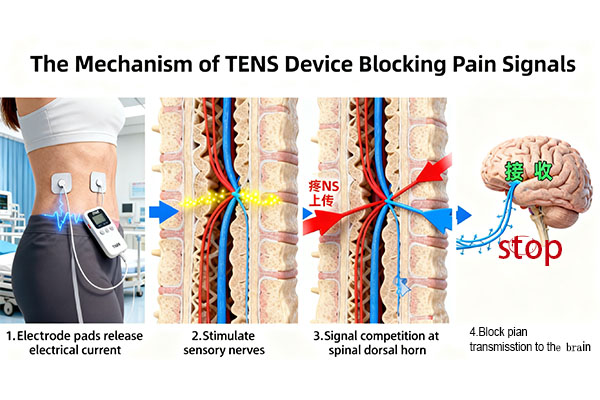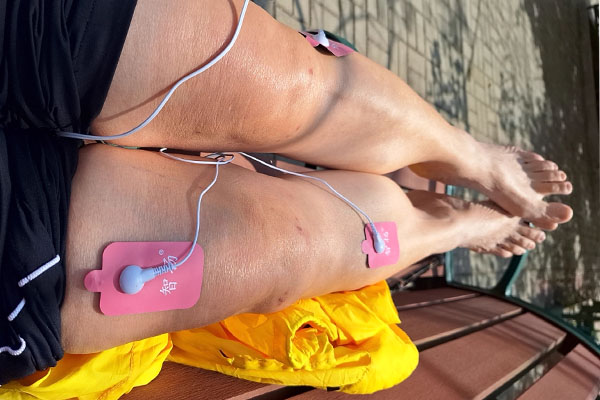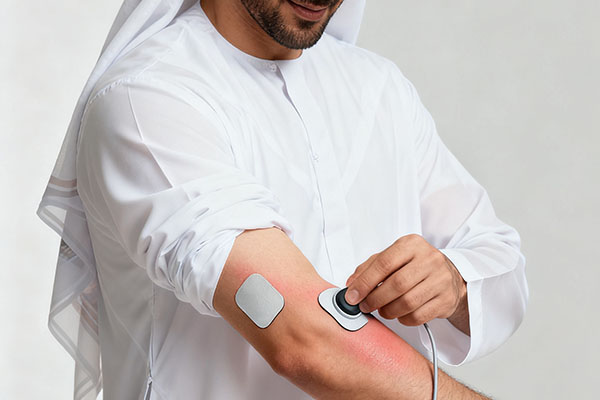What is Mini TENS?
Are you tired of persistent pain controlling your life? Relying on medication isn't always the answer. A Mini TENS offers a drug-free method to manage discomfort right from your pocket.
A Mini TENS is a compact, portable Transcutaneous Electrical Nerve Stimulation device. It delivers low-voltage electrical currents through the skin via electrodes to help relieve acute and chronic pain. It is a widely used non-drug alternative for personal pain management you can use almost anywhere.

I’ve spent my career in the personal care device industry. I've seen many technologies emerge, but few are as practical and effective as TENS. When we managed to package this technology into a "mini" device, it was a game-changer for accessibility. It puts powerful, non-invasive pain relief into the hands of everyday users. Now, let’s explore exactly what these small devices can do for you and your clients.
What is the purpose of a TENS device?
Constant aches and pains can be completely draining. You want effective relief without always reaching for medication. A TENS device provides a targeted, drug-free way to manage your pain directly.
The main purpose of a TENS device is pain relief. It is used for many conditions, including chronic back pain, arthritis, sports injuries, and period pain. It works by blocking pain signals from reaching the brain and helping the body release its own natural painkillers.

In my experience working with wellness centers and physical therapy clinics, the demand for non-pharmacological pain solutions is huge. Clients want control over their pain management. A TENS device provides that control. It's not just about feeling better; it's about empowering users with a tool they can rely on.
How It Manages Pain
A TENS device works in two primary ways. Understanding this science helps my distribution partners explain the value of these products clearly.
- The Gate Control Theory: This is the main principle. The nerves in your body can only handle so many signals at once. The gentle electrical pulses from the TENS unit create a tingling sensation. This sensation travels along the same nerves as the pain signals. The tingling essentially "closes the gate" on the pain messages, preventing them from reaching the brain.
- Endorphin Release: The electrical stimulation can also prompt your body to produce more endorphins. These are natural chemicals that act like morphine, reducing your perception of pain.
Common Uses for TENS
| Condition | How TENS Helps |
|---|---|
| Lower Back Pain | Relieves chronic aches and muscle spasms. |
| Arthritis | Reduces joint pain and stiffness. |
| Nerve Pain | Can help manage sharp, shooting pains. |
| Post-Workout Soreness | Eases delayed onset muscle soreness (DOMS). |
This versatility makes it a valuable product for retail buyers in pharmacies and home healthcare channels.
Can TENS help with nerve pain?
Nerve pain is sharp, shooting, and difficult to ignore. Finding consistent relief can be frustrating. TENS technology offers a non-invasive way to help manage this unique type of discomfort.
Yes, TENS can be effective for some types of nerve pain, also known as neuropathic pain. By stimulating the nerves with a gentle electrical current, it can interrupt the pain signals before they reach the brain, providing temporary relief for conditions like sciatica or diabetic neuropathy.

When I talk to procurement managers for health product distributors, the topic of nerve pain management always comes up. It's a widespread issue. While TENS is not a cure, it is a valuable tool in a comprehensive pain management plan. The results can vary from person to person, but for many, it provides a significant improvement in their quality of life.
Understanding the Limitations
It's important to set realistic expectations. TENS provides symptomatic relief, meaning it helps manage the pain but doesn't treat the underlying cause of the nerve damage.
- Effectiveness Varies: Some people experience substantial relief, while others find it less effective. The type and location of the nerve pain play a big role.
- Temporary Relief: The pain relief usually lasts while the device is on and for a short period after. Regular use is often necessary to manage chronic nerve pain.
- Professional Guidance: For neuropathic pain, it is crucial to consult a doctor or physical therapist. They can help determine if TENS is appropriate and guide the user on the correct pad placement and settings for their specific condition.
For my B2B clients, I always emphasize the need for clear instructions and disclaimers. Positioning the TENS device as a supportive tool, rather than a miracle cure, builds trust and ensures customer satisfaction.
Can you use TENS during pregnancy?
Pregnancy brings many joys, but it can also bring aches and pains. You might look for drug-free options for relief. It is critical to know that using a TENS device during pregnancy requires extreme caution.
Using a TENS device during pregnancy is generally not recommended without strict medical supervision. It is strictly forbidden during the first trimester. You should never place the electrodes on the abdomen, lower back, or pelvic area at any point during pregnancy as it could pose risks.

Safety is the most important factor in the personal care device industry. My company, SQX Health, has strict protocols, and we hold certifications like CE and ROHS. When it comes to pregnancy, there is no room for error. I tell every client and distributor that the rule is simple: if a user is pregnant, they must talk to their doctor first.
Why Caution is Necessary
The concern is that the electrical currents from the TENS unit could potentially affect the developing baby or induce premature labor, especially when used near the abdomen or lower back.
| When to AVOID TENS in Pregnancy | Why It's Risky |
|---|---|
| First Trimester | This is a critical period of fetal development. Risks are highest. |
| On the Abdomen or Pelvis | Electrical currents could potentially stimulate uterine contractions. |
| On the Lower Back | The proximity to the uterus makes this a high-risk placement area. |
Some healthcare providers may approve TENS for pain relief on other body parts, like the shoulders, or specifically for pain management during labor under controlled conditions. However, this decision must come from a qualified medical professional. This is non-negotiable, and it's a key piece of safety information that must be included with any TENS product.
What are EMS mini massager side effects?
You see mini massagers everywhere that use EMS technology. They seem convenient, but are they completely safe? While generally safe, improper use of an EMS mini massager can lead to some side effects.
Potential side effects of an EMS mini massager include skin irritation or redness under the electrode pads, muscle soreness if used at too high an intensity, and minor muscle twitching. These effects are usually temporary. However, the device is unsafe for individuals with pacemakers or epilepsy.

Many of my clients ask about the difference between TENS and EMS. It's a critical distinction. TENS targets nerves for pain relief. EMS (Electrical Muscle Stimulation) targets muscles to cause contractions, often for strengthening or recovery. They are not the same. Misusing an EMS device, or any electrical stimulation device, can cause problems.
Ensuring Safe Use
As a manufacturer, providing clear guidelines is our responsibility. Here’s what users need to know to avoid side effects.
- Start Low and Go Slow: Always begin with the lowest intensity setting and gradually increase it to a level that is comfortable but not painful. Over-stimulating the muscles can lead to soreness.
- Proper Pad Placement: Make sure the electrode pads stick firmly to clean, dry skin. Poor contact can cause a stinging sensation or skin irritation.
- Follow Time Limits: Do not use the device for longer than the recommended time, typically 15-20 minutes on one area.
- Know the Contraindications: This is the most important safety rule.
Who Should Not Use EMS?
Certain individuals should avoid EMS devices altogether due to serious health risks.
- People with pacemakers or other implanted electronic devices.
- Individuals with epilepsy.
- People with serious heart conditions.
- On areas with active cancer.
Choosing a certified, well-made product from a reputable supplier and following the instructions are the best ways to ensure a safe and effective experience.
Conclusion
Mini TENS devices offer a portable, non-drug solution for pain management, while EMS focuses on muscles. For safe and effective results, always use certified products and follow professional medical advice.











